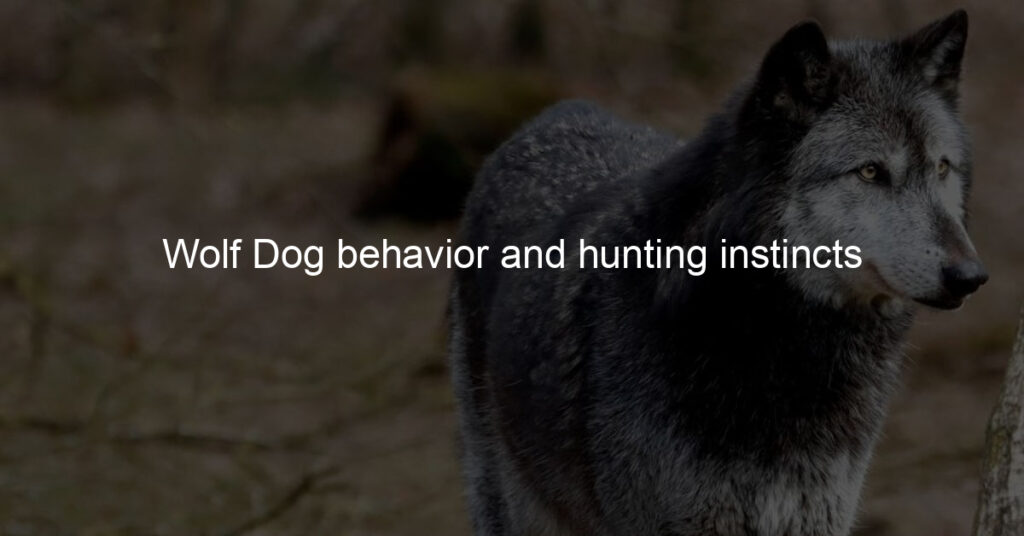Owning a wolf dog can be an amazing and rewarding experience. They make wonderful pets, providing loyal companionship and protection coupled with their wild side making them truly unique among other canine breeds.
Most of the time they are like any other domesticated animal, but it is important to be aware that their behavior and instincts still have many similarities to wild wolves—which includes strong hunting instincts! Read on if you want some insight into how these special creatures think and act when it comes to prey, as well as some guidance on training them in manners acceptable for everyday life.
What is the Behaviour of a wolf-dog?
Wolf dogs, or wolf hybrids as they are sometimes called, can make wonderful companions with their loyal and affectionate behavior. As a result of their genetic makeup, these hybrid animals exhibit the more social personality traits of wolves, such as loyalty to family members and pack mentality– however, they also present canine attributes like being highly trainable and demonstrating strong bonds with their humans.
While general behavior is unpredictable, Wolf dogs have certain characteristics that may be emphasized depending on the mix of breeds. They tend to be curious and active with a need for both physical activity and mental stimulation.
Therefore, it’s important to provide them with both stimulations for them to stay happy and entertained. All in all, Wolf dogs make for friendly pets but due to their high energy level and need for lots of exercise, they’re better suited for people who lead an active lifestyle.
Do wolf dogs hunt?
Yes, wolf dogs have strong hunting instincts. Wolves are natural predators and this trait is passed on to Wolf dogs. They tend to be more active than most domesticated breeds, making them particularly prone to chasing smaller animals like cats or birds.
Although their prey drive can be trained through obedience classes, owners need to keep their Wolf dogs on a leash or in an enclosed area, especially when outside. Additionally, it’s good practice to provide your pet with plenty of chew toys and other outlets for their energy instead of allowing them to roam free.
Do wolf dogs have a high prey drive?
Yes, wolf dogs have a high prey drive due to their inherent hunting instincts. This means that they are particularly prone to chasing after smaller animals like cats or birds and can be difficult to call back when in pursuit of their target.
Owners need to provide plenty of exercises, playtime, and mental stimulation for their Wolf dogs, to keep them mentally and physically healthy. Additionally, it’s important to use positive reinforcement when training your pet and be consistent with commands for them to better understand what is expected of them.
How do wolves communicate when hunting?
Wolves are incredibly social animals and possess highly advanced communication methods for both within their pack as well as when hunting. While out looking for prey, wolves will coordinate their efforts through body language, vocalization, and scent marking.
They often use physical postures like bowing or crouching to tell each other what they should be doing. Additionally, wolf packs use different kinds of vocalizations like warning cries, cackles, and howls to send messages to other members of the pack to inform them about danger or a potential food source.
Finally, wolves mark certain areas with their scents by urinating in places to communicate where they have been and create a hierarchy amongst themselves. Incredibly, these creatures can communicate so effectively and efficiently when hunting–a testament to their intelligence!
Conclusion: Wolf Dog behavior and hunting instincts
Going back to the wolf-dog, their behavior, and instincts can be a true joy for any family when it is well trained. With the right discipline, patience, and love, these intelligent animals can become exceptional companions. Playing games that allow them to use their natural hunting instincts like hide-and-seek or fetch can provide hours of entertainment for both you and your wolf dog buddy.
Depending on where you live, hunting opportunities may be available as well; check local laws before taking your pup out into the woods. Whether they are being cuddled on the couch or participating in an outdoor adventure, these animals are sure to make lasting memories with those lucky enough to own one.








